Predictions of an economic slowdown or even a full blown recession have been rumbling for months. For the business owner this inevitably means a time to re-evaluate budgets and tighten up on spending. The first casualty in a recession is often the marketing spend – but this may prove to be a short sighted approach. Advertising Guru David Ogilvy asked question in his book Ogilvy on Advertising “What should you do in time of recession, when you need every penny to sustain your earnings? Stop advertising?
He points out that if you stop advertising a brand which is still in its introductory phase, you will probably kill it — forever. Studies of the last 6 recessions have demonstrated that companies which do not cut back their advertising budgets achieve greater increases in profit than companies which do cut back.
In a Morril survey of 40,000 men and women involved in the purchase of 23 industrial products over five years, it was found that share-of-market went up in bad times — when advertising was continued.
He goes on to point out that the American Business Press that had pie charts of sales of companies which cut back their advertising expenditure during the 1974-75 recessions compared with companies that did not cut back. The companies that did not cut their advertising budgets had more than doubled their sales 2 years later while sales from the companies that cut their advertising had barely gone up 50%. Three years later sales were down for companies that had cut their advertising while it was up for those that did not. The net income for these companies also followed the same suit over the same period of years — those companies that did not cut their advertising had more than tripled in sales, while companies that did cut back during the recession had barely doubled.
Ultimately, you want your business to grow whatever the economic climate, and marketing is a key tool in achieving this. Instead of panicking, the small business owner should focus on these seven key areas. Get these right and your business should not only ride out the economic storm, but actively thrive throughout.
Here are 7 marketing areas that you should be focussed on over the coming months:
1. Remember you company’s most important asset. Your existing customers are your best bet for bringing in more business- and making more profit. Maintain good communication with your satisfied customers; let them know about everything you offer and what you can do for them. Reward their loyalty by offering new products or services at a preferential rate and give them a reason to spend more money with you.
2. Make your own headlines. Some companies seem to be forever in the newspapers or on the TV and radio. But this doesn’t happen by accident – it happens because they actively pursue publicity. If you have something that present or potential customers might be interested in, tell them about it. Surveys, predictions and articles that link into a topical issue are particularly newsworthy. If you sit back and think, you will be able to find something that you do, or make that will be of interest to an audience of potential customers.
3. Give it away for free – then reap the reward. Use the law of reciprocity in your favour: if you give a customer something, they will have the urge to give you something in return. Take food samples at the deli counter. You try the product, you like it so you are more likely to buy it. Following this principle, try offering special reports, insiders’ information, free talks or tips booklets – anything that may be useful to the prospect. Ideally it will cost you very little, but will be of value to the recipient – they now have an implicit obligation to give you something in return.
4. Become the ‘go to’ guy. Instead of trying to appeal to the widest market possible, develop a niche. In reality, the more specialist you are, the more people will seek out and buy from you. One way of achieving this is to create a specific brochure for every sector of your market. This rule also applies to direct mail letters, e-mail shots, sales presentations etc.
Work out what the problems are in your target markets and create a product to address them. This shows the customer that you understand their problems and have the solution to help them. Work out the specific benefits for your customers and you will unlock the real sales potential.
5. Make sure you know your customers. Put a reference code on every type of marketing that you produce and ask people to quote it when they call you up. Make it company policy that any new business enquiry is checked to find out where the person heard about you. Also, bear in mind you want to know how much a customer’s lifetime value is, not just how much they spent with you in one transaction.
6. Spend time online. It’s no longer good enough just have a brochure website – it needs to constantly be updated if it is to feature in the rankings and pique people’s interest .The simplest and easiest way to do this is to put a blog on your website and keep it regularly updated with news and views. By creating regular content and referencing articles from other sites that you think are of interest to prospects, you will find that you can increase your site’s Google ranking dramatically.
7. Don’t give up. If you have a product or service worth selling, believe in it. When someone says ‘no’, they may mean ‘not yet’ or even ‘I don’t know enough about the benefits of what you are offering’. Clients are not always ready to buy now and they don’t always respond to the same messages. Create a target group of good customers and hot prospects and keep in touch with them for months or years. If you’ve got your targeting right, they will buy from you – in the future if not now.
If the economic forecasts come true, many small businesses will not survive the next decade. I believe that those with the foresight to look long term and maintain their marketing activity will be the ones who most successfully weather the storms ahead.

MD & Head of Digital Marketing
Jessica has worked in digital marketing for over 10 years and has watched it evolve from an experimental marketing option to an essential tool for most businesses. She is driven to help businesses achieve their objectives using the best digital marketing resources available and recognises that each business is different. Jessica devours the latest news about digital marketing and is constantly learning in order to stay ahead of the trends for clients.







